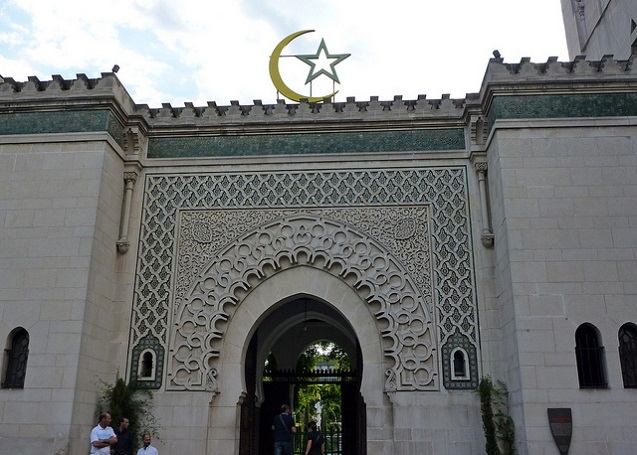
Honest, paywall-free news is rare. Please support our boldly independent journalism with a donation of any size.
Mosques, like Turkey’s famous and stunning Blue Mosque are sacred places of religious worship in addition to community gathering centers. While Muslims may come to the mosque for prayer and other religious events, the mosque is often a place for community activities, serving as a place for people with like interests to utilize the mosque’s library and other resources, take classes, hold discussion groups, and more. Like other religious buildings, the mosque is viewed as a safe space. That’s changing in France, as in the wake of the horrific Charlie Hebdo attack last week, extremists in France are storming across the country to terrorize the nation’s Muslims.
Pigs’ heads have been nailed to prayer room doors (pigs are considered unclean in Islam), mosques have been set on fire and shot at, and graffiti has been scrawled across walls while at least one Muslim has been physically assaulted. While these actions are the moves of a scant minority of Islamophobic extremists, they reflect the growing problem of aggressive right-wing sentiment across Europe, where Muslims are not the only community that has to field racial and religiously-motivated attacks by neo-Nazis and others angry about the continent’s multicultural community. The Charlie Hebdo attacks provided a convenient smokescreen for those looking to launch retaliatory attacks, claiming to be defending France from a fictional Muslim menace — despite the fact that the vast majority of Muslims were equally horrified by the attacks and were dismayed by the actions of the killers, who claimed to be acting in the name of Islam.
Some 10 percent of France’s population is Muslim, a reflection of the nation’s cultural diversity, but not all French are happy with this. The nation has strongly held to secular values and some are convinced that the growing Muslim population will somehow threaten these values — which is precisely why the nation banned the burqa and forbade Muslim women from driving while wearing a headscarf. Fears about Muslim influence are further fed by right-wing extremism in Europe and the rise of parties like the National Front, headed by Marie Le Pen. The party’s platform includes a strong anti-immigration stance, backed by a return to nationalism and “French values,” joining other conservative parties across Europe, like UKIP in the UK, in opposing immigration and creating a threatening environment for immigrants and those of immigrant descent. Already, the Charlie Hebdo attacks are like manna for the National Front, which jumped on the incident to leverage more support from the French populace.
The situation in France has become so tense that troops have been deployed to protect synagogues from copycat attacks — and they’re also being sent to mosques, thanks to the growing number of assaults on the Muslim community. The anti-Muslim backlash in France is also spilling over into other nations, particularly in Germany, where mosque attacks and anti-Muslim sentiment have been escalating problems in recent years. As France reels in the wake of the attacks, the nation’s Muslim community faces a dual load of sorrow as it mourns those lost in the terrorist attack and fears future reprisals. France’s Muslims may soon need an “I’ll ride with you” movement to be safe in their own nation.
A terrifying moment. We appeal for your support.
In the last weeks, we have witnessed an authoritarian assault on communities in Minnesota and across the nation.
The need for truthful, grassroots reporting is urgent at this cataclysmic historical moment. Yet, Trump-aligned billionaires and other allies have taken over many legacy media outlets — the culmination of a decades-long campaign to place control of the narrative into the hands of the political right.
We refuse to let Trump’s blatant propaganda machine go unchecked. Untethered to corporate ownership or advertisers, Truthout remains fearless in our reporting and our determination to use journalism as a tool for justice.
But we need your help just to fund our basic expenses. Over 80 percent of Truthout’s funding comes from small individual donations from our community of readers, and over a third of our total budget is supported by recurring monthly donors.
Truthout has launched a fundraiser to add 379 new monthly donors in the next 6 days. Whether you can make a small monthly donation or a larger one-time gift, Truthout only works with your support.